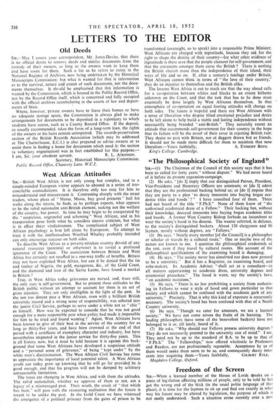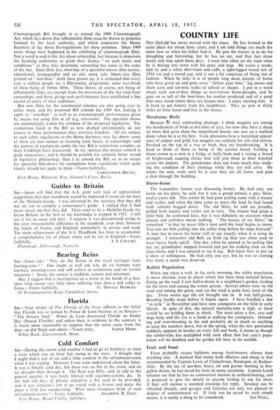Freedom of the Screen
SIR,—When a learned member of the House of Lords speaks on a piece of legislation affecting millions of people, only to be told he has got the wrong end of the tick (in the usual polite language of that place), it is time for the layman to sit up and find out exactly in what way his future may be altered by legislation, the purpose of which is not easily understood.. Such a situation arose recently over a new
Cinematograph Bill brought in to amend the 1909 Cinematograph Act, which lays down that inflammable films must be shown in premises licensed by the local authority, and which empowers the Home Secretary to lay down fire-regulations for these premises. Since 1909 many things have happened in the exhibiting of cinematograph films. Not a word is said in the Act about censorship,' but because it empowers the licensing authorities to grant their licence "on such terms and conditions" as they may determine, censorship has come in the wake of the Act. Since then, too, showings of a specialist nature (film society, educational, propagandist and so on), using safe 16mm.-size films printed on " non-flam " stock have grown up; it is estimated that every year a million people see a film-society programme, some two-thirds of these being of 16rnm. films. These shows, of course, not being of inflammable films, are exempt from the provisions of the Act (and from censorship), and those giving such performances have established a fine record of safety of their audiences.
But now films for the commercial cinemas are also going over to safety stock, and the proposed Bill extends the 1909 Act, making it apply to 'non-flam " as well as to cinematograph performances given by means not using film at all (e.g. television). The specialist shows are automatically within the compass of the proposed legislation. The exemptions listed in the Bill as now drafted unfortunately do not restore to these performances their previous freedom. All are subject to such safety regulations as the Home Secretary may lay down; some of them are also subject to licensing (and, hence, to censorship)—and the pattern of exemptions under the new Bill is somewhate complex, as their Lordships have discovered. In my opinion this stricter control is quite unnecessary, and it should be possible for someone better versed in legislative phraseology than I to amend the Bill, so as to secure for specialist film-shows the exemptions from regulations which quite clearly should not apply to them.—Yours faithfully,



































 Previous page
Previous page